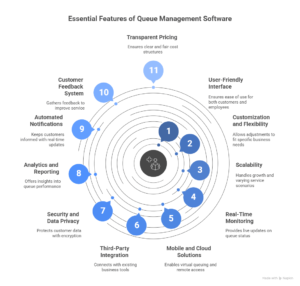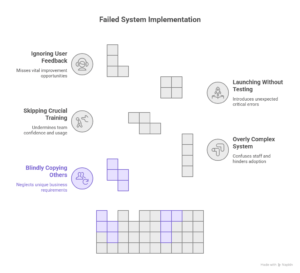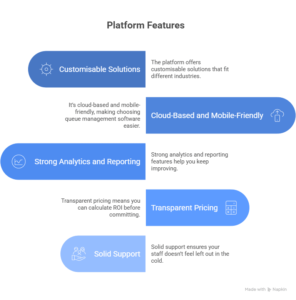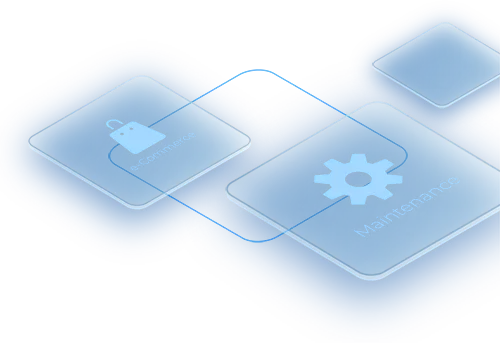Key Takeaways
-
Understand your business first – The right queue management software starts with your company’s unique flow, customer needs, and industry challenges.
-
Focus on scalability, flexibility, and integration – A good system should be user-friendly, customisable, secure, and able to grow with your business.
-
Test, train, and adapt – Always run demos, train your team, and collect feedback to avoid common mistakes and ensure smooth adoption.
Key Factors to Consider Before Choosing a Queue Management Software
Before we dive into fancy features, let’s keep one thing straight: Selecting the right queue management software starts with your business, not the tool. Every company has its own flow, challenges, and customer habits.

1. User-Friendly Interface and Ease of Use
Ask yourself: Is the Queue Management System Easy for Both Customers and Employees to Use? A confusing system is just another headache. The best ones feel natural, almost like using a simple app on your phone. If it’s software that is easy for both your teams and customers to use, you’re already winning.
2. Customisation and Flexibility
Every business runs queues differently. Your queue management software should offer customisable solutions—like branding, languages, and workflows—so you can adjust things without tech support.
3. Scalability for Business Growth
Queues grow with your business. A strong queue management system should handle various service scenarios, from small setups to multi-branch operations, so it scales as demand increases.
4. Centralised Dashboard & Real-Time Monitoring
Think of this as a control room for your queues. Managers should see live updates—like wait times or staff availability—without running from counter to counter.
5. Mobile & Cloud-Based Solutions
People don’t want to be tied to a waiting room anymore. Cloud and mobile features let customers join a queue from anywhere. This is where virtual queuing really shines.
6. Third-Party Integration (APIs)
Your queue management software shouldn’t live in a bubble. It should connect with CRMs, payment systems, or appointment scheduling tools you already use.
7. Security and Data Privacy
Handling customer data means you need solid protection. Always check how the vendor handles encryption, backups, and compliance.
8. Analytics and Reporting Tools
If you can’t measure it, you can’t improve it. Good systems provide numbers on wait times, service duration, and staff performance. This helps you spot where customers get stuck.
9. Automated Notifications & Customer Communication
Nobody likes sitting in the dark. Look for automated SMS or app alerts that update customers in real time.
10. Customer Feedback System & Support
A built-in feedback option helps you know if things are working. Bonus: pick a vendor with responsive support—so you’re not stuck googling solutions during a busy day.
11. Transparent Pricing & ROI
Don’t just grab the cheapest option. Look at the long-term picture. Does it save you staff time? Improve satisfaction? When you choose the best software solution, make sure it delivers real value.
Here’s a quick checklist to guide you:
- Understand Your Business Needs & Goals → traffic volume, service type, and industry challenges.
- Evaluate Key Features & Functionality → user-friendliness, analytics, virtual queuing, and Customisable Solutions.
- Consider Technical Aspects → scalability, integrations, security.
- Research Vendors & Costs → look at reputation, support, and Transparent Pricing & ROI.
- Demos and Trials → always test before you commit.
That’s the foundation of Choosing the right queue management software.
Common Mistakes to Avoid When Choosing Queue Management Software
Even with the best intentions, businesses often slip up. Here are some traps to watch for:

- Copying another business without checking your own needs.
- Picking a system with too many fancy features that confuse staff.
- Skipping training—if your team isn’t confident, the system fails.
- Launching without a trial run.
- Ignoring feedback from customers or employees.
Remember, selecting the best queue management system depends on several factors, and it depends on your business’s size, complexity, industry, and goals.
Queue Management Systems – Types, Implementation & Market Overview
Here’s how different industries are using queue systems in 2025:
| Type / Use Case |
Implementation Step |
Matching 2025 Trend |
| Banks & Financial Services – need secure, fast handling of large crowds |
Assess Business Needs → Pitfall: copying others instead of mapping your real traffic patterns |
AI-driven predictive queuing – reduces fraud risks & optimises teller/wait time distribution |
| Hospitals & Clinics – patient flow and emergency prioritisation |
Choose Right Features → Pitfall: adding too many modules that confuse staff |
Cloud-based virtual queuing – patients book slots remotely, reducing physical crowding |
| Government Offices – high demand for permits, ID, and citizen services |
Train Staff Properly → Pitfall: skipping onboarding, causing confusion at counters |
Omnichannel queue systems – kiosks + apps + SMS updates for citizens |
| Retail & Shopping Malls – peak hour traffic and billing queues |
Test the System Before Launch → Pitfall: going live without trial leads to customer frustration |
Personalised queues – loyalty data + purchase history prioritisation |
| Universities & Educational Institutions – admissions and student service centres |
Collect Feedback & Adjust → Pitfall: ignoring student/parent feedback after rollout |
AI analytics dashboards – real-time queue insights for administrators |
| Hotels & Travel – booking counters, concierge, and check-ins |
Applies across all steps above |
Seamless digital check-in via mobile queue apps |
So whether you’re in banking, healthcare, or retail, Choosing the right queue management system looks a little different. That’s why it helps to Learn how to find the best queue management software that matches your exact use case.
Why EBR is the Right Choice for Your Business
Now, let’s talk solutions. If you’re wondering How to Choose a Queue Management System, one option that consistently stands out is EBR.

Here’s why:
- Their platform offers Customisable Solutions that fit different industries.
- It’s cloud-based and mobile-friendly, making Choosing Queue Management Software easier.
- Strong analytics and reporting features help you keep improving.
- Transparent pricing means you can calculate ROI before committing.
- Solid support ensures your staff doesn’t feel left out in the cold.
In other words, when you’re asking yourself How to Choose the Best Queue Management Solution, EBR checks the boxes without overcomplicating things.
Conclusion
If you’ve read this far, you’re already ahead of most businesses still struggling with long lines. The trick is simple: don’t rush. Explore the 10 best queue management systems of 2025, but make sure the one you pick fits your unique flow.
Whether you’re choosing the best Queue Management Software or just trying to Choose the Best Queue Management Tool, remember: the right choice isn’t about fancy features. With EBR Software, it’s about a system that’s reliable, flexible, and easy for both teams and customers.
So when it’s time to Choose the Best Queue Management For Your Business, take your time, test before buying, and pick a partner who understands your needs. That’s how you truly choose the right software.










